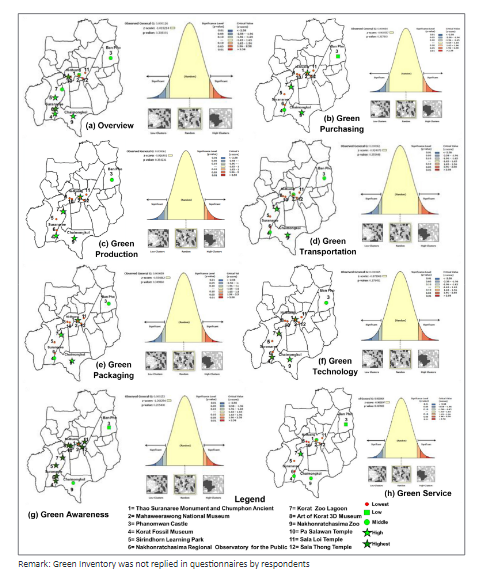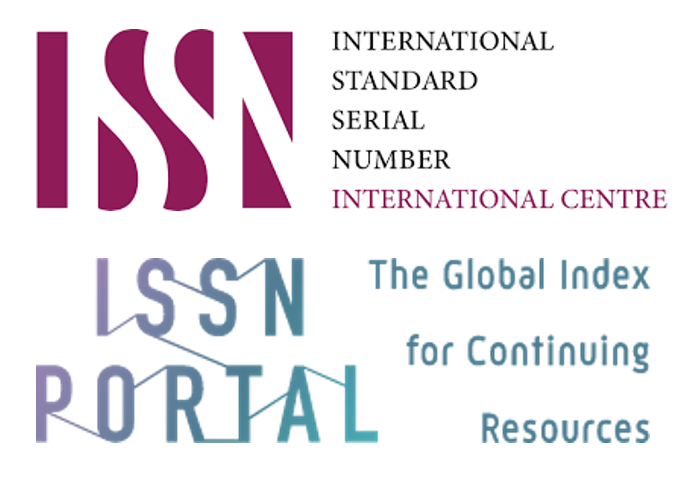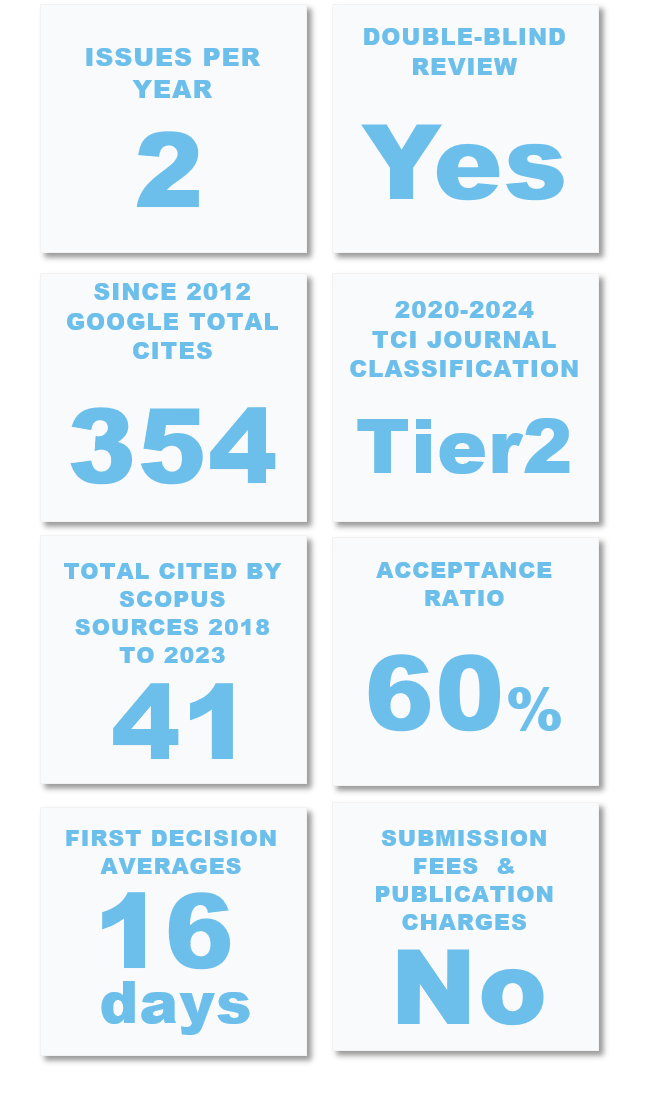Using GIS Techniques for Changing Spatial Distribution Patterns of Green Logistics Activities at Tourist Attraction to Current COVID-19 Situation: The Case of Muang Nakhonratchasima District
Keywords:
Green logistics’ activity, Tourist attraction, Spatial distribution pattern, The COVID-19 situationAbstract
The aim of this study is to use Geographical Information System (GIS) techniques for spatial distribution patterns’ change of green logistics activities at tourist attractions to current COVID-19 pandemic in Muang Nakhonratchasima district. This study compared data based on 49 purposive questionnaires in year 2016 and 2021 using high/Low clustering Getis-Ord General G in ArcGIS program. The results found were totally in pattern of complete spatial randomness in both year 2016 and 2021. These outputs demonstrate normative pattern in such 12 tourist attractions of Muang Nakhonratchasima district. It is interesting to find that green awareness and green service are high among 8 green logistics activity. The green awareness and green service has been found to change positively in 9 and 8 respectively out of 12 tourist attractions. Also, these public and private organizations have realized to reverse logistics, using barcode, electric email, and information online for facing the current pandemic. Consequently, the obtained results will be suggested for Tourism Authority Thailand (TAT) Nakhonratchasima and office of Nakhonratchasima City Municipality.Downloads
References
Addington, R. N., Aplet, G. H., Battaglia, M. A., Briggs, J. S., Brown, P. M., Cheng, A. S., Dickinson, Y., Feinstein, J. A., Pelz, K. A., Regan, C. M., Thinnes, J., Truex, R., Fornwalt, P. J., Gannon, B., Julian, C. W., Underhill, J. L. & Wolk, B. (2018). Principles and practices for the restoration of ponderosa pine and dry mixed-conifer forests of the Colorado Front Range. Retrieved April 18, 2021, from https://www.fs.usda.gov/treesearch/pubs/55638
AEC Tourism Connectivity. (2016). Thailand pushes the strength of the country to penetrate the ASEAN trade and investment market. Retrieved March 9, 2021, from http://th.aectourismthai.com/content2/4017
Balaman, S. Y. (2018). Chapter 7 - Modeling and Optimization Approaches in Design and Management of Biomass-Based Production Chains. Retrieved from https://www.sciencedirect.com/science/article/pii/B9780128142783000078.pdf
Bishop, M. P., Young, B. W., Huo, D. and Chi, Z. (2020). Spatial Analysis and Modeling in Geomorphology. Retrieved from https://www.sciencedirect.com/science/article/pii/B9780124095489124297.pdf
Bradley, K. (2021). Green Logistics. Retrieved April 9, 2021, from https://dlca.logcluster.org/display/LOG/Green+Logistics
Caliper. (2021). GIS Software. Retrieved June 8, 2021, from https://www.caliper.com/maptitude/gis_software/default.htm
Charlton, M. (2009). Spatial Pattern. Retrieved from https://www.sciencedirect.com/topics/earth-and-planetary-sciences/nearest-neighbor-analysis.pdf
Corvec, N. L., Sporli, K. B., Rowland, J. & Lindsay, J. (2013). Spatial distribution and alignments of volcanic centers: Clues to the formation of monogenetic volcanic fields. Retrieved from https://www.sciencedirect.com/science/article/abs/pii/S0012825 213001037.pdf
DHL. (2020). Green Logistics: Good for the environment, good for business. Retrieved May 6, 2021, from https://www.dhl.com/th-en/home/logistics-solutions/green-logistics.html
Dogru, A. O., David, R. M., Ulugtekin, N., Goksel, C., Seker, D. Z. & Sozen S. (2017). GIS based spatial pattern analysis: Children with Hepatitis A in Turkey. Environmental Research, 156, 349-357. https://doi.org/10.1016/j.envres.2017.04.001
Geog, (2020). Point Pattern Analysis. Retrieved May 10, 2021, from https://storymaps.arcgis.com/stories/2d7ebcc8ae5c4df3b8ad56a3e9a82317
Grzybalska, M. (2010). Application of GIS techniques to analysis of spatial distribution patterns of loom- weights, spindle-whorls and tokens at Pistiros, ancient Thrace, within a domestic/urban context. Virtual Archaeology Review, 1(1), 103-109.
Hu, Y. & Liu, K. (2017). Chapter 3 - Tour inspection technology of transmission lines. Retrieved from https://www.sciencedirect.com/science/article/pii/B9780128126448000035.pdf
Interlake Mecalux. (2019). Green logistics: definitions, challenges and solutions. Retrieved May 10, 2021, from https://www.interlakemecalux.com/blog/green-logistics
Isitwa Inc. (2017). GIS is a Powerful Business Tool for Logistics and Transportation. Retrieved May 19, 2021, from https://www.isitwa.com/gis-logistics/
Jacobsen, T. (2020). The road towards green logistics. Retrieved July 9, 2021, from https://www.mixmove. io/blog/how-do-we-achieve-green-logistics
Jantakat, Y. & Chutiman, N. (2016). Geoinformatics Technology for Spatial Pattern and Distribution of Green Logistics’ Activities in Tourism Place of Muang District, Nakhon Ratchasima Province. Nakhon Ratchsima, Thailand: Rajamangala University of Technology Isan.
Jerram, D. A., Dobson, K. J., Morgan, D. J., Pankhurst, M. J. (2018). Chapter 8 - The Petrogenesis of Magmatic Systems: Using Igneous Textures to Understand Magmatic Processes. Retrieved from https://www.sciencedirect.com/science/article/pii/B978012809749600008X.pdf
Kamsingnork, K. (2014). Open concept for green economy. Retrieved from http://www.tei.or.th/publications/2014-download/2014-TBCSD-Greenbusiness-y8-2.pdf
Li, H., Li, H., Ding, Z., Hu, Z., Chen, F., Wang, K., Peng, Z. & Shen, H. (2020). Spatial statistical analysis of Coronavirus Disease 2019 (Covid-19) in China. Retrieved April 12, 2021, from https://geospatialhealth.net/index.php/gh/article/view/867/888#content/figure_reference_6
Ludwig, J. A. & Reynolds, J. F. (1988). Statistical Ecology: A Primer on Methods and Computing. Retrieved from https://www2.ib.unicamp.br/profs/thomas/NE002_2011/maio12LR%201988%20StatEcol%20sel1.pdf
Melyantono, S. E., Susetya, H., Widayani, P. Tenaya, I. W. M. & Hartawan, H. W. (2021). The rabies distribution pattern on dogs using average nearest neighbor analysis approach in the Karangasem District, Bali, Indonesia, in 2019. Retrieved from https://www.ncbi.nlm.nih.gov/pmc/articles/PMC8076469/pdf/Vetworld-14-614.pdf
Ministry of Transport. (2018). Monitoring and Evaluation Report Operations of the Ministry of Transport According to the Transport and Traffic Development Master Plan 2011–2020 Fiscal Year 2017 (October 2016 – September 2017). Retrieved from https://complain.mot.go.th/prproject/files_upload/otp/report_otp_tracking2561.pdf
Ministry of Tourism and Sports. (2020). Strategy for promoting green tourism. Retrieved from https://chainat.mots.go.th/download/article/article_20200605154529.pdf
Ministry of Tourism and Sports. (2016). ASEAN Tourism Strategic Plan. Retrieved June 28, 2021 from https://www.mots.go.th/ewt_dl_link.php?nid=10854
Modaberi, A., Soosani, J., Vajari, K. A., Khosravi, S., Farhadi, P. & Kianfar, M. (2014). The distribution, mixture, and diversity models of woody species in Spatial Pattern of Persian oak (Quercus brantii var. persica) forests. Advances in Environmental Biology, 8(11), 911-918.
Nowak, P., Cutforth, L. B., Cabot, P. E. & Kahn, B. M. (2001).Chapter 19 - Nitrogen Management by Producers: A Multiple Scale Perspective. Retrieved from https://www.sciencedirect.com/science/article/pii/B9780444504869500212.pdf
Office of the National Economic and Social Development Council. (2021). Master Plan under the National Strategy: Tourism. Retrieved from http://nscr.nesdb.go.th/wp-content/uploads/2021/01/06_NS_05.pdf
Office of Tourism Authority of Thailand (TAT) Nakhonratchasima. (2021). Nakhon Ratchasima Travel Guide. Nakhonratchasima, Thailand: DD Media Plus Company Limited.
Peters, D. P. C., Goslee, S. C., Collins, S. L., Gosz, J. R. (2013).Landscape Diversity. Retrieved from https://www.sciencedirect.com/science/article/pii/B9780123847195000848.pdf
Pian, S. & Menier, D. (2018). Chapter 6 - Spatial and Statistical Analyses of Clifftop Retreat in the Gulf of Morbihan and Quiberon Peninsula, France: Implications on Cliff Evolution and Coastal Zone Management. Retrieved from https://www.sciencedirect.com/science/article/pii/B9780128143506000069.pdf
Rodrigue, J.-P., Slack, B. & Comtois, C. (2020). Green Logistics. Retrieved March 29, 2021, from https://transportgeography.org/contents/applications/green-logistics/
Pacheco, G. D. (2006). Discrete probability models to assess spatial distribution patterns in natural populations and an algorithm for likelihood ratio goodness of fit test. Retrieved from http://www.scielo.org.bo/pdf/ran/v3n3/v3n3_a07.pdf
Subsanguanboon, W.. (2019). Sustainable Supply Chain Management in Thailand 4.0. Retrieved April 12, 2021, from https://dol.dip.go.th/en/category/2019-02-08-08-57-30/2019-03-15-10-58-56
Walker, S. E. (2011). Density and Dispersion. Retrieved April 12, 2021, from https://www.nature.com/scitable/knowledge/library/density-and-dispersion-19688035/
Welty, C. (2014). Chapter 22 - The Regenerative Community Régénérer: A Haitian Model and Process Toward a Sustainable, Self-Renewing Economy. Retrieved from https://www.sciencedirect.com/science/article/pii/B9780123979148000229.pdf

Downloads
Published
How to Cite
Issue
Section
License
Copyright (c) 2021 International Journal of Building, Urban, Interior and Landscape Technology (BUILT)

This work is licensed under a Creative Commons Attribution-NonCommercial-NoDerivatives 4.0 International License.











